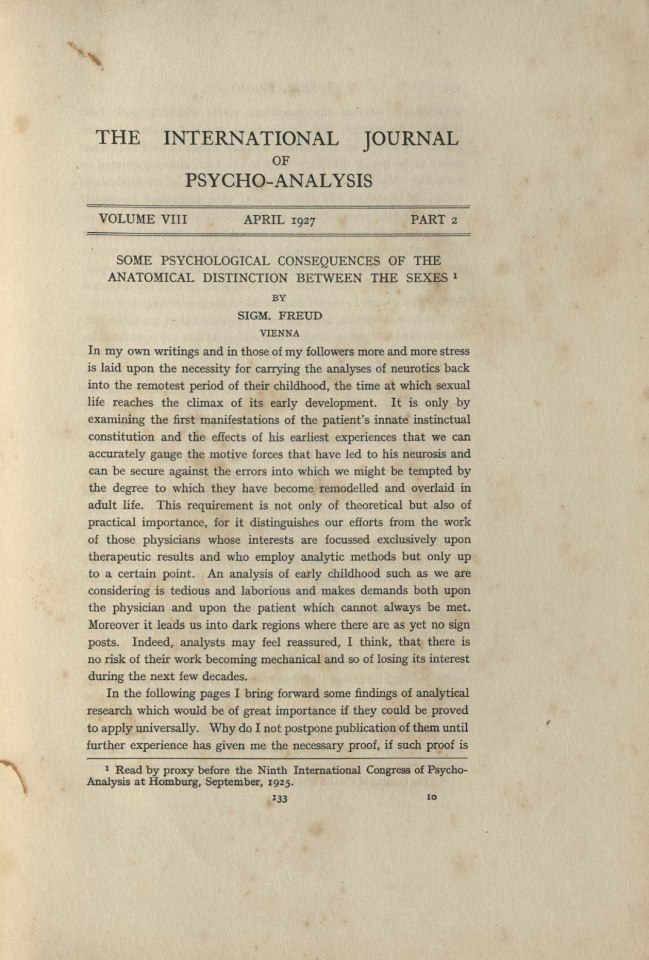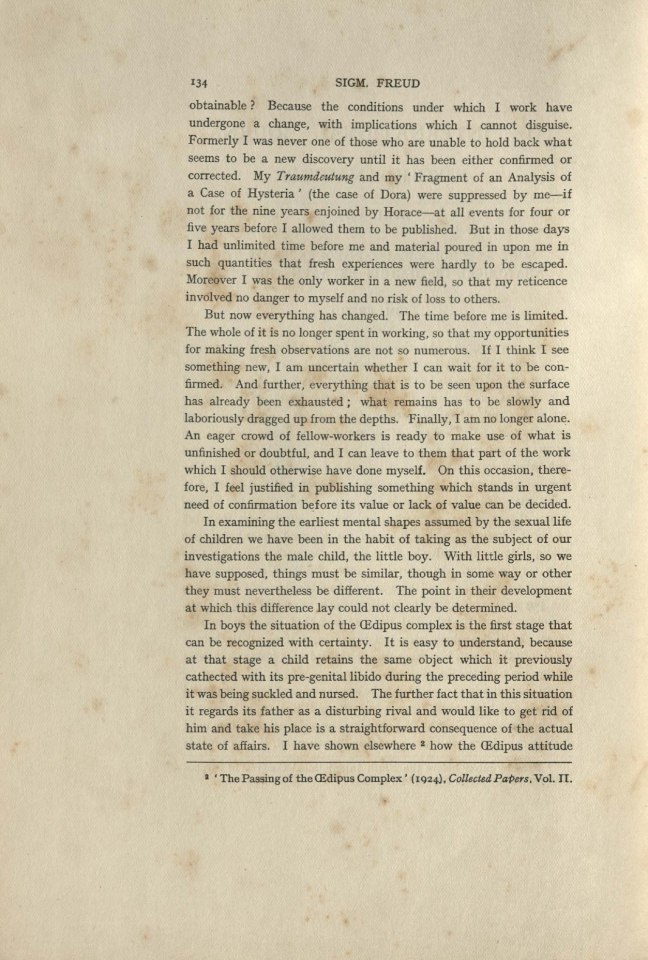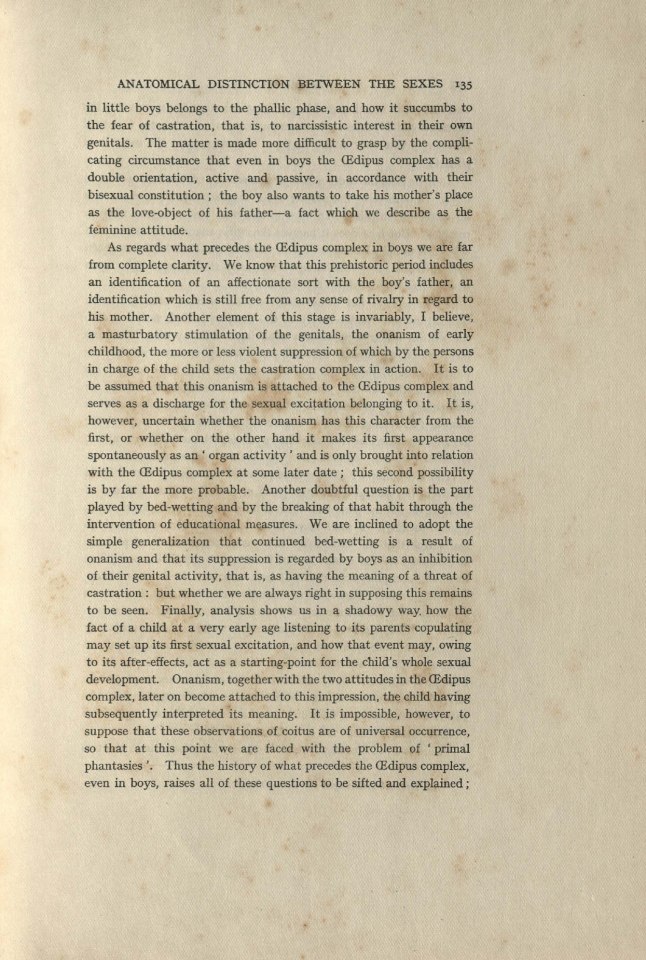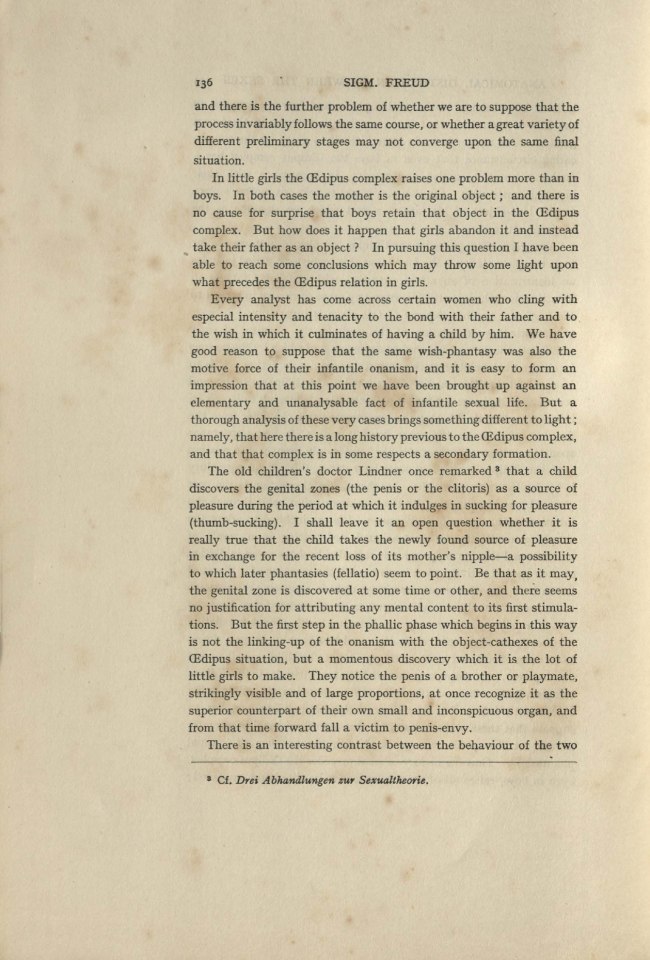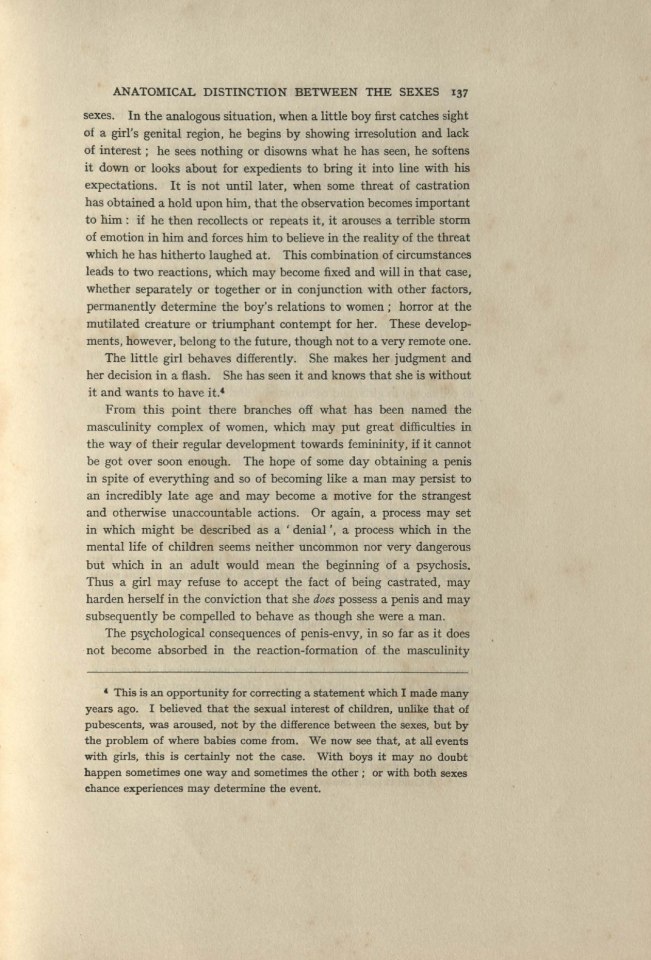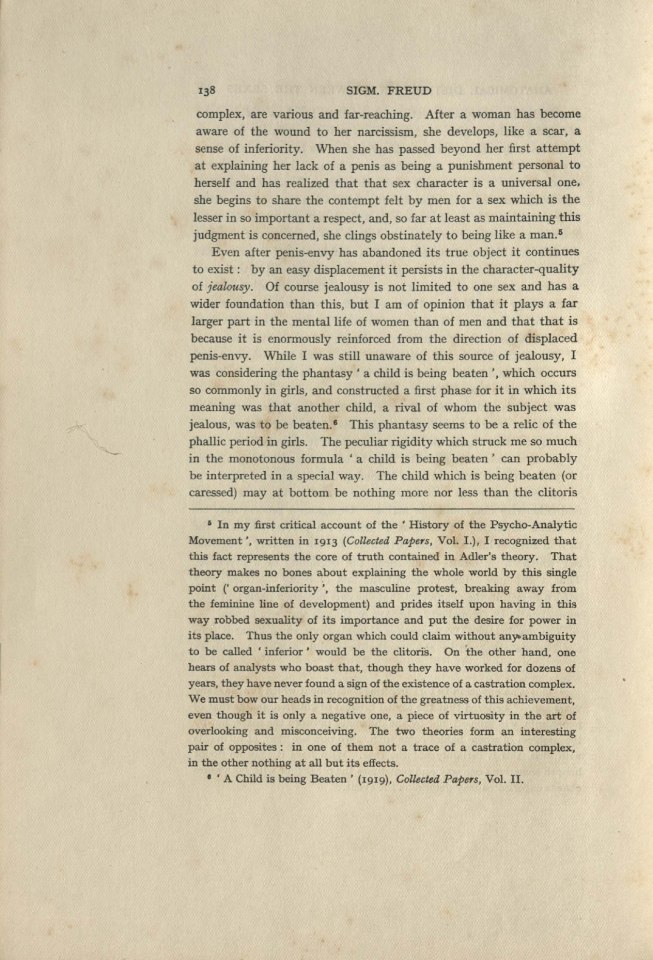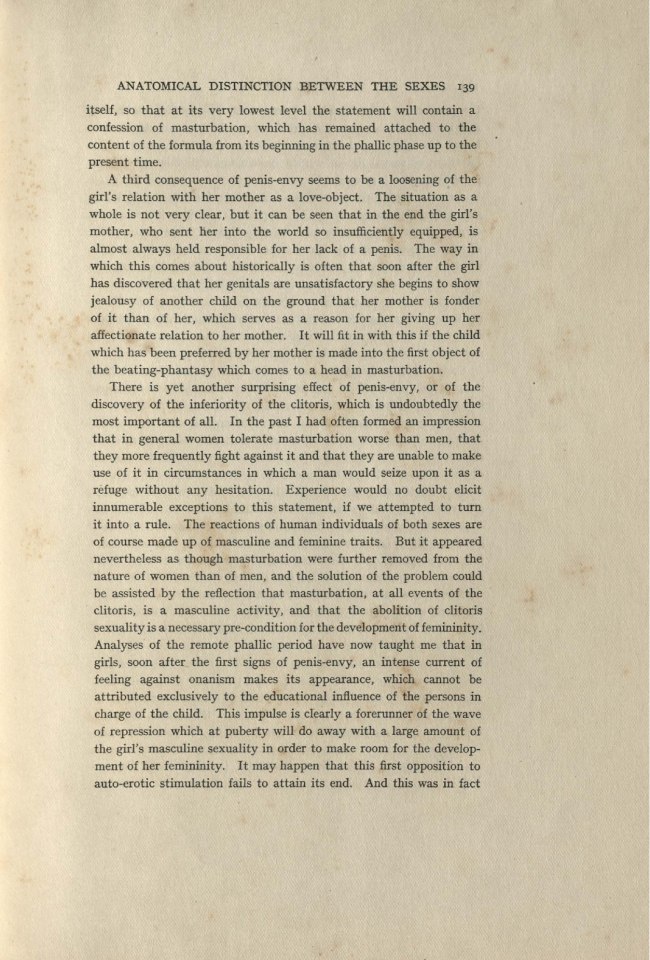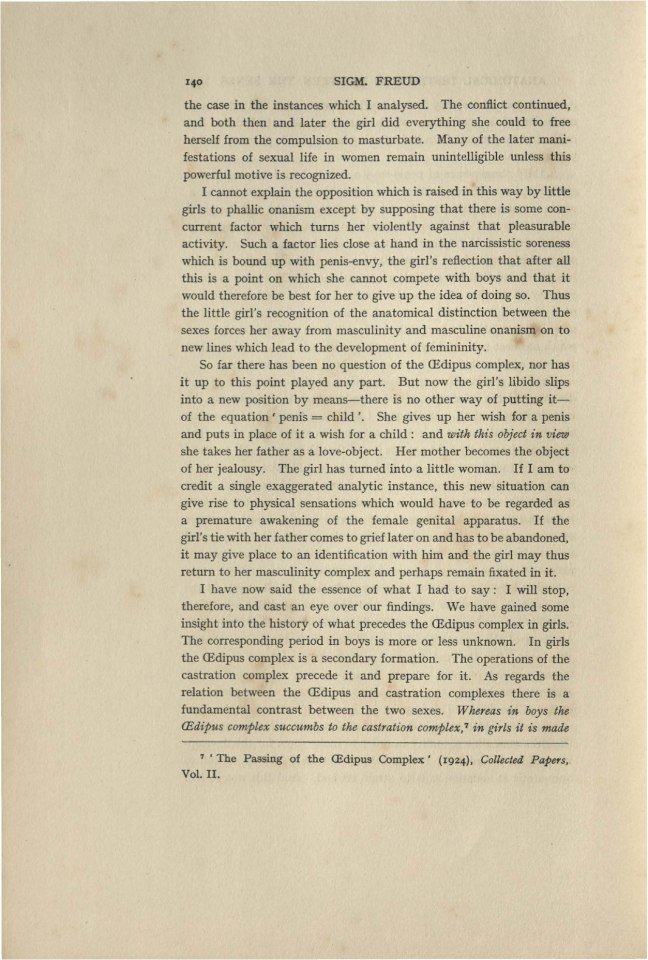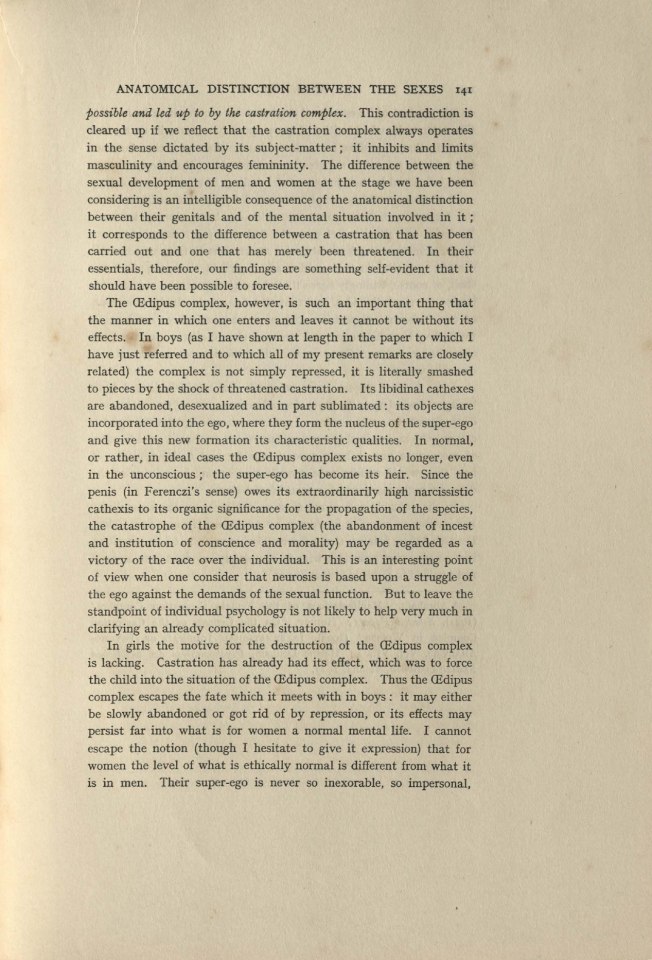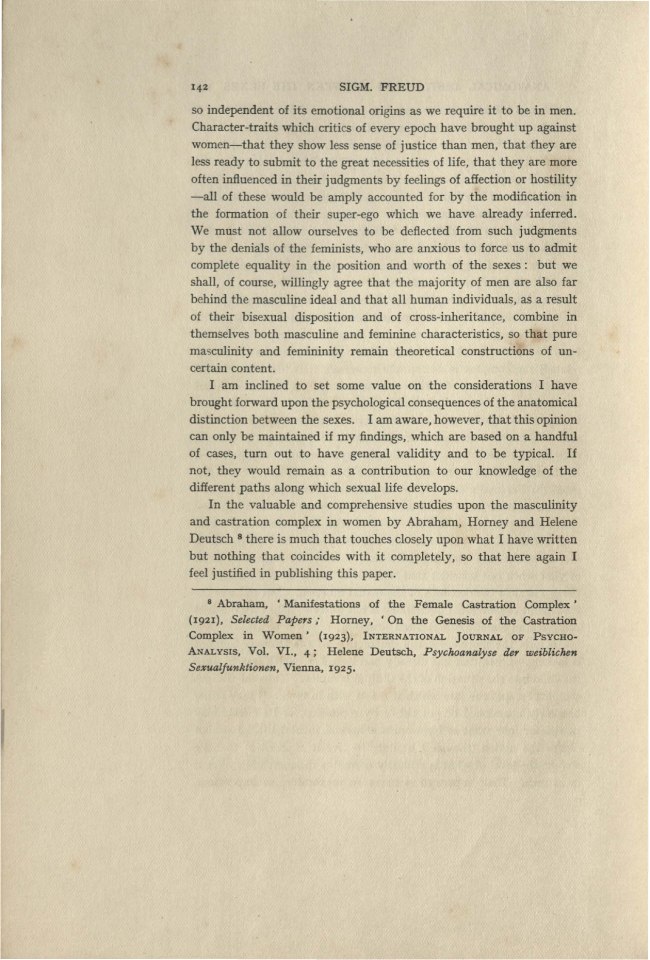S.
%
THE INTERNATIONAL JOURNAL
OF
PSYCHO-ANALYSIS
VOLUME VIII APRIL 1927 PART 2SOME PSYCHOLOGICAL CONSEQUENCES OF THE
ANATOMICAL DISTINCTION BETWEEN THE SEXES !
BY
SIGM. FREUD
VIENNA
In my own writings and in those of my followers more and more stress
is laid upon the necessity for carrying the analyses of neurotics back
into the remotest period of their childhood, the time at which sexual
life reaches the climax of its early development. It is only by
examining the first manifestations of the patient's innate instinctual
constitution and the effects of his earliest experiences that we can
accurately gauge the motive forces that have led to his neurosis and
can be secure against the errors into which we might be tempted by
the degree to which they have become remodelled and overlaid in
adult life. This requirement is not only of theoretical but also of
practical importance, for it distinguishes our efforts from the work
of those physicians whose interests are focussed exclusively upon
therapeutic results and who employ analytic methods but only up
to a certain point. An analysis of early childhood such as we are
considering is tedious and laborious and makes demands both upon
the physician and upon the patient which cannot always be met.
Moreover it leads us into dark regions where there are as yet no sign
posts. Indeed, analysts may feel reassured, I think, that there is
no risk of their work becoming mechanical and so of losing its interestduring the next few decades.
In the following pages I bring forward some findings of analytical
research which would be of great importance if they could be proved
to apply universally. Why do I not postpone publication of them until
further experience has given me the necessary proof, if such proof is1 Read by proxy before the Ninth International Congress of Psycho-
Analysis at Homburg, September, 1925.133 10
S.
134 | SIGM. FREUD
obtainable? Because the conditions under which I work have
undergone a change, with implications which I cannot disguise.
Formerly I was never one of those who are unable to hold back what
seems to be a new discovery until it has been either confirmed or
corrected. My Traumdeutung and my ‘ Fragment of an Analysis of
a Case of Hysteria ’ (the case of Dora) were suppressed by me—if
not for the nine years enjoined by Horace—at all events for four or
five years before I allowed them to be published. But in those days
I had unlimited time before me and material poured in upon me in
such quantities that fresh experiences were hardly to be escaped.
Moreover I was the only worker in a new field, so that my reticence
involved no danger to myself and no risk of loss to others.But now everything has changed. The time before me is limited.
The whole of it is no longer spent in working, so that my opportunities
for making fresh observations are not so numerous. If I think I see
something new, I am uncertain whether I can wait for it to be con-
firmed. And further, everything that is to be seen upon the surface
has already been exhausted ; what remains has to be slowly and
laboriously dragged up from the depths. Finally, I am no longer alone.
An eager crowd of fellow-workers is ready to make use of what is
unfinished or doubtful, and I can leave to them that part of the work
which I should otherwise have done myself. On this occasion, there-
fore, I feel justified in publishing something which stands in urgent
need of confirmation before its value or lack of value can be decided.In examining the earliest mental shapes assumed by the sexual life
of children we have been in the habit of taking as the subject of our
investigations the male child, the little boy. With little girls, so we
have supposed, things must be similar, though in some way or other
they must nevertheless be different. The point in their development
at which this difference lay could not clearly be determined.In boys the situation of the (Edipus complex is the first stage that
can be recognized with certainty. It is easy to understand, because
at that stage a child retains the same object which it previously
cathected with its pre-genital libido during the preceding period while
it was being suckled and nursed. The further fact that in this situation
it regards its father as a disturbing rival and would like to get rid of
him and take his place is a straightforward consequence of the actual
state of affairs. I have shown elsewhere 2 how the (Edipus attitude3 ‘The Passing of the Œdipus Complex’ (1924), Collected Papers, Vol. IT.
+
S.
ANATOMICAL DISTINCTION BETWEEN THE SEXES 135
in little boys belongs to the phallic phase, and how it succumbs to
the fear of castration, that is, to narcissistic interest in their own
genitals. The matter is made more difficult to grasp by the compli-
cating circumstance that even in boys the (Edipus complex has a
double orientation, active and passive, in accordance with their
bisexual constitution ; the boy also wants to take his mother’s place
as the love-object of his father—a fact which we describe as the
feminine attitude.As regards what precedes the (Edipus complex in boys we are far
from complete clarity. We know that this prehistoric period includes
an identification of an affectionate sort with the boy's father, an
identification which is still free from any sense of rivalry in regard to
his mother. Another element of this stage is invariably, I believe,
a masturbatory stimulation of the genitals, the onanism of early
childhood, the more or less violent suppression of which | by the persons
in charge of the child sets the castration complex in ‘action. It is to
be assumed that this onanism is attached to the (Edipus complex and
serves as a discharge for the sexual excitation belonging to it. It is,
however, uncertain whether the onanism has this character from the
first, or whether on the other hand it makes its first appearance
spontaneously as an ‘ organ activity " and is only brought into relation
with the Œdipus complex at some later date ; this second possibility
is by far the more probable. Another doubtful question is the part
played by bed-wetting ‘and by the breaking of that habit through the
intervention of educational measures. We are inclined to adopt the
simple generalization that continued bed-wetting is a result of
onanism and that its suppression is regarded by boys as an inhibition
of their genital activity, that is, as having the meaning of a threat of
castration : but whether we are always right in supposing this remains
to be seen. Finally, analysis shows us in a shadowy way, how the
fact of a child at a very early age listening to its parents copulating
may set up its first sexual excitation, and how that event may, owing
to its after-effects, act as a starting-point for the child’s whole sexual
development. Onanism, together with the two attitudes in the Œdipus
complex, later on become attached to this impression, the child having
subsequently interpreted its meaning. It is impossible, however, to
suppose that these observations of coitus are of universal occurrence,
so that at this point we are faced with the problem of ' primal
phantasies'. Thus the history of what precedes the Œdipus complex,
even in boys, raises all of these questions to be sifted and explained ;S.
136 ① SIGM. FREUD
and there is the further problem of whether we are to suppose that the
process invariably follows the same course, or whether a great variety of
different preliminary stages may not converge upon the same final
situation.In little girls the (Edipus complex raises one problem more than in
boys. In both cases the mother is the original object ; and there is
no cause for surprise that boys retain that object in the (Edipus
complex. But how does it happen that girls abandon it and instead_ take their father as an object ? In pursuing this question I have been
able to reach some conclusions which may throw some light upon
what precedes the (Edipus relation in girls.Every analyst has come across certain women who cling with
especial intensity and tenacity to the bond with their father and to
the wish in which it culminates of having a child by him. We have
good reason to suppose that the same wish-phantasy was also the
motive force of their infantile onanism, and it is easy to form an
impression that at this point we have been brought up against an
elementary and unanalysable fact of infantile sexual life. But a
thorough analysis of these very cases brings something different tolight ;
namely, that here there is a long history previous to the (Edipus complex,
and that that complex is in some respects a secondary formation.The old children's doctor Lindner once remarked 3 that a child
discovers the genital zones (the penis or the clitoris) as a source of
pleasure during the period at which it indulges in sucking for pleasure
(thumb-sucking). I shall leave it an open question whether it is
really true that the child takes the newly found source of pleasure
in exchange for the recent loss of its mother’s nipple—a possibility
to which later phantasies (fellatio) seem to point. Be that as it may,
the genital zone is discovered at some time or other, and there seems
no justification for attributing any mental content to its first stimula-
tions. But the first step in the phallic phase which begins in this way
is not the linking-up of the onanism with the object-cathexes of the
Œdipus situation, but a momentous discovery which it is the lot of
little girls to make. They notice the penis of a brother or playmate,
strikingly visible and of large proportions, at once recognize it as the
superior counterpart of their own small and inconspicuous organ, and
from that time forward fall a victim to penis-envy.There is an interesting contrast between the behaviour of the two
3 Cf. Drei Abhandlungen zur Sexualtheorie.
S.
ANATOMICAL DISTINCTION BETWEEN THE SEXES 137
sexes. In the analogous situation, when a little boy first catches sight
of a girl's genital region, he begins by showing irresolution and lack
of interest ; he sees nothing or disowns what he has seen, he softens
it down or looks about for expedients to bring it into line with his
expectations. It is not until later, when some threat of castration
has obtained a hold upon him, that the observation becomes important
to him : if he then recollects or repeats it, it arouses a terrible storm
of emotion in him and forces him to believe in the reality of the threat
which he has hitherto laughed at. This combination of circumstances
leads to two reactions, which may become fixed and will in that case,
whether separately or together or in conjunction with other factors,
permanently determine the boy's relations to women ; horror at the
mutilated creature or triumphant contempt for her. These develop-
ments, however, belong to the future, though not to a very remote one.The little girl behaves differently. She makes her judgment and
her decision in a flash. She has seen it and knows that she is without
it and wants to have it.From this point there branches off what has been named the
masculinity complex of women, which may put great difficulties in
the way of their regular development towards femininity, if it cannot
be got over soon enough. The hope of some day obtaining a penis
in spite of everything and so of becoming like a man may persist to
an incredibly late age and may become a motive for the strangest
and otherwise unaccountable actions. Or again, a process may set
in which might be described as a 'denial”, a process which in the
mental life of children seems neither uncommon nor very dangerous
but which in an adult would mean the beginning of a psychosis.
Thus a girl may refuse to accept the fact of being castrated, may
harden herself in the conviction that she does possess a penis and may
subsequently be compelled to behave as though she were a man.The psychological consequences of penis-envy, in so far as it does
not become absorbed in the reaction-formation of the masculinity4 This is an opportunity for correcting a statement which I made many
years ago. I believed that the sexual interest of children, unlike that of
pubescents, was aroused, not by the difference between the sexes, but by
the problem of where babies come from, We now see that, at all events
with girls, this is certainly not the case. With boys it may no doubt
happen sometimes one way and sometimes the other ; or with both sexes
chance experiences may determine the event.S.
138 SIGM. FREUD
complex, are various and far-reaching. After a woman has become
aware of the wound to her narcissism, she develops, like a scar, a
sense of inferiority. When she has passed beyond her first attempt
at explaining her lack of a penis as being a punishment personal to
herself and has realized that that sex character is a universal one,
she begins to share the contempt felt by men for a sex which is the
lesser in so important a respect, and, so far at least as maintaining this
judgment is concerned, she clings obstinately to being like a man.5
Even after penis-envy has abandoned its true object it continues
to exist: by an easy displacement it persists in the character-quality
of jealousy. Of course jealousy is not limited to one sex and has a
wider foundation than this, but I am of opinion that it plays a far
larger part in the mental life of women than of men and that that is
because it is enormously reinforced from the direction of displaced
penis-envy. While I was still unaware of this source of jealousy, I
was considering the phantasy ' a child is being beaten ', which occurs
so commonly in girls, and constructed a first phase for it in which its
meaning was that another child, a rival of whom the subject was
jealous, was to be beaten.® This phantasy seems to be a relic of the
phallic period in girls. The peculiar rigidity which struck me so much
in the monotonous formula ‘a child is being beaten’ can probably
be interpreted in a special way. The child which is being beaten (or
caressed) may at bottom be nothing more nor less than the clitoris5 In my first critical account of the “ History of the Psycho-Analytic
Movement ", written in 1913 (Collected Papers, Vol. 1.), 1 recognized that
this fact represents the core of truth contained in Adler's theory. That
theory makes no bones about explaining the whole world by this single
point (‘ organ-inferiority ', the masculine protest, breaking away from
the feminine line of development) and prides itself upon having in this
way robbed sexuality of its importance and put the desire for power in
its place. Thus the only organ which could claim without anyambiguity
to be called ‘ inferior ” would be the clitoris. On the other hand, one
hears of analysts who boast that, though they have worked for dozens of
years, they have never found a sign of the existence of a castration complex.
‘We must bow our heads in recognition of the greatness of this achievement,
even though it is only a negative one, a piece of virtuosity in the art of
overlooking and misconceiving. The two theories form an interesting
pair of opposites: in one of them not a trace of a castration complex,
in the other nothing at all but its effects.9 * A Child is being Beaten ` (1919), Collected Papers, Vol. II.
S.
ANATOMICAL DISTINCTION BETWEEN THE SEXES 139
itself, so that at its very lowest level the statement will contain a
confession of masturbation, which has remained attached to the
content of the formula from its beginning in the phallic phase up to the
present time.A third consequence of penis-envy seems to be a loosening of the
girl's relation with her mother as a love-object. The situation as a
whole is not very clear, but it can be seen that in the end the girl's
mother, who sent her into the world so insufficiently equipped, is
almost always held responsible for her lack of a penis. The way in
which this comes about historically is often that soon after the girl
has discovered that her genitals are unsatisfactory she begins to show
jealousy of another child on the ground that her mother is fonder
of it than of her, which serves as a reason for her giving up her
affectionate relation to her mother. It will fit in with this if the child
which has been preferred by her mother is made into the first object of
the beating-phantasy which comes to a head in masturbation.There is yet another surprising effect of penis-envy, or of the
discovery of the inferiority of the clitoris, which is undoubtedly the
most important of all. In the past I had often formed an impression
that in general women tolerate masturbation worse than men, that
they more frequently fight against it and that they are unable to make
use of it in circumstances in which a man would seize upon it as a
refuge without any hesitation. Experience would no doubt elicit
innumerable exceptions to this statement, if we attempted to turn
it into a rule. The reactions of human individuals of both sexes are
of course made up of masculine and feminine traits. But it appeared
nevertheless as though masturbation were further removed from the
nature of women than of men, and the solution of the problem could
be assisted by the reflection that masturbation, at all events of the
clitoris, is a masculine activity, and that the abolition of clitoris
sexuality is a necessary pre-condition for the development of femininity.
Analyses of the remote phallic period have now taught me that in
girls, soon after the first signs of penis-envy, an intense current of
feeling against onanism makes its appearance, which cannot be
attributed exclusively to the educational influence of the persons in
charge of the child. This impulse is clearly a forerunner of the wave
of repression which at puberty will do away with a large amount of
the girl’s masculine sexuality in order to make room for the develop-
ment of her femininity. It may happen that this first opposition to
auto-erotic stimulation fails to attain its end. And this was in factS.
140 SIGM. FREUD
the case in the instances which I analysed. The conflict continued,
and both then and later the girl did everything she could to free
herself from the compulsion to masturbate. Many of the later mani-
festations of sexual life in women remain unintelligible unless this
powerful motive is recognized.I cannot explain the opposition which is raised in this way by little
girls to phallic onanism except by supposing that there is some con-
current factor which turns her violently against that pleasurable
activity. Such a factor lies close at hand in the narcissistic soreness
which is bound up with penis-envy, the girl's reflection that after all
this is a point on which she cannot compete with boys and that it
would therefore be best for her to give up the idea of doing so. Thus
the little girl's recognition of the anatomical distinction between the
sexes forces her away from masculinity and masculine onanism on to
new lines which lead to the development of femininity. いSo far there has been no question of the (Edipus complex, nor has
it up to this point played any part. But now the girl's libido slips
into a new position by means—there is no other way of putting it—
of the equation " penis = child’. She gives up her wish for a penis
and puts in place of it a wish for a child : and with this object in view
she takes her father as a love-object. Her mother becomes the object
of her jealousy. The girl has turned into a little woman. If I am to
credit a single exaggerated analytic instance, this new situation can
give rise to physical sensations which would have to be regarded as
a premature awakening of the female genital apparatus. If the
girl's tie with her father comes to grief later on and has to be abandoned,
it may give place to an identification with him and the girl may thus
return to her masculinity complex and perhaps remain fixated in it.I have now said the essence of what I had to say: I will stop,
therefore, and cast an eye over our findings. We have gained some
insight into the history of what precedes the (Edipus complex in girls.
The corresponding period in boys is more or less unknown. In girls
the (Edipus complex is a secondary formation. The operations of the
castration complex precede it and prepare for it. As regards the
relation between the (Edipus and castration complexes there is a
fundamental contrast between the two sexes. Whereas in boys the
Œdipus complex succumbs to the castration complex,” in girls it is made7 " The Passing of the Œdipus Complex" (1924), Collected Papers,
Vol. II.S.
ANATOMICAL DISTINCTION BETWEEN THE SEXES 141
possible and led up to by the castration complex. This contradiction is
cleared up if we reflect that the castration complex always operates
in the sense dictated by its subject-matter ; it inhibits and limits
masculinity and encourages femininity. The difference between the
sexual development of men and women at the stage we have been
considering is an intelligible consequence of the anatomical distinction
between their genitals and of the mental situation involved in it ;
it corresponds to the difference between a castration that has been
carried out and one that has merely been threatened. In their
essentials, therefore, our findings are something self-evident that it
should have been possible to foresee.The Œdipus complex, however, is such an important thing that
the manner in which one enters and leaves it cannot be without its
effects. In boys (as I have shown at length in the paper to which I
have just referred and to which all of my present remarks are closely
related) the complex is not simply repressed, it is literally smashed
to pieces by the shock of threatened castration. Its libidinal cathexes
are abandoned, desexualized and in part sublimated : its objects are
incorporated into the ego, where they form the nucleus of the super-ego
and give this new formation its characteristic qualities. In normal,
or rather, in ideal cases the (Edipus complex exists no longer, even
in the unconscious ; the super-ego has become its heir. Since the
penis (in Ferenczi's sense) owes its extraordinarily high narcissistic
cathexis to its organic significance for the propagation of the species,
the catastrophe of the Œdipus complex (the abandonment of incest
and institution of conscience and morality) may be regarded as a
victory of the race over the individual. This is an interesting point
of view when one consider that neurosis is based upon a struggle of
the ego against the demands of the sexual function. But to leave the
standpoint of individual psychology is not likely to help very much in
clarifying an already complicated situation.In girls the motive for the destruction of the (Edipus complex
is lacking. Castration has already had its effect, which was to force
the child into the situation of the (Edipus complex. Thus the (Edipus
complex escapes the fate which it meets with in boys : it may either
be slowly abandoned or got rid of by repression, or its effects may
persist far into what is for women a normal mental life. I cannot
escape the notion (though I hesitate to give it expression) that for
women the level of what is ethically normal is different from what it
is in men. Their super-ego is never so inexorable, so impersonal,S.
142 SIGM. FREUD
so independent of its emotional origins as we require it to be in men.
Character-traits which critics of every epoch have brought up against
women—that they show less sense of justice than men, that they are
less ready to submit to the great necessities of life, that they are more
often influenced in their judgments by feelings of affection or hostility
—all of these would be amply accounted for by the modification in
the formation of their super-ego which we have already inferred.
We must not allow ourselves to be deflected from such judgments
by the denials of the feminists, who are anxious to force us to admit
complete equality in the position and worth of the sexes: but we
shall, of course, willingly agree that the majority of men are also far
behind the masculine ideal and that all human individuals, as a result
of their bisexual disposition and of cross-inheritance, combine in
themselves both masculine and feminine characteristics, so that pure
masculinity and femininity remain theoretical constructions of un-
certain content.I am inclined to set some value on the considerations I have
brought forward upon the psychological consequences of the anatomical
distinction between the sexes. I am aware, however, that this opinion
can only be maintained if my findings, which are based on a handful
of cases, turn out to have general validity and to be typical. If
not, they would remain as a contribution to our knowledge of the
different paths along which sexual life develops.In the valuable and comprehensive studies upon the masculinity
and castration complex in women by Abraham, Horney and Helene
Deutsch 8 there is much that touches closely upon what I have written
but nothing that coincides with it completely, so that here again I
feel justified in publishing this paper.8 Abraham, ‘Manifestations of the Female Castration Complex '
(1921), Selected Papers; Horney, ‘On the Genesis of the Castration‘Complex in Women” (1923), INTERNATIONAL JOURNAL OF PSYCHO-
ANALYSIS, Vol VI, 4; Helene Deutsch, Psychoanalyse der weiblichen
Sexualfunktionen, Vienna, 1925.
j-viii-1927-2
133
–142
Die vorliegende Übersetzung unterliegt bis 2032 dem Urheberrechtsschutz. Die Veröffentlichung erfolgt mit freundlicher Genehmigung des International Psychoanalytic Journals.
